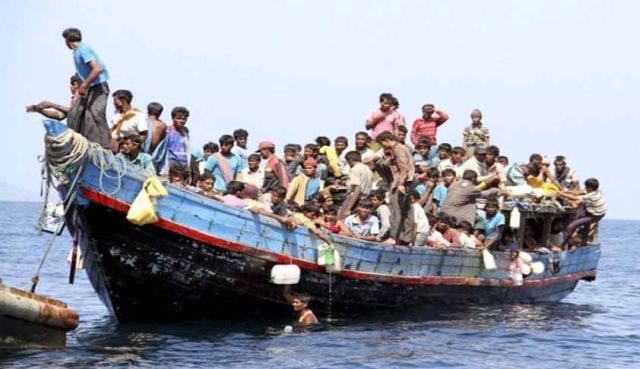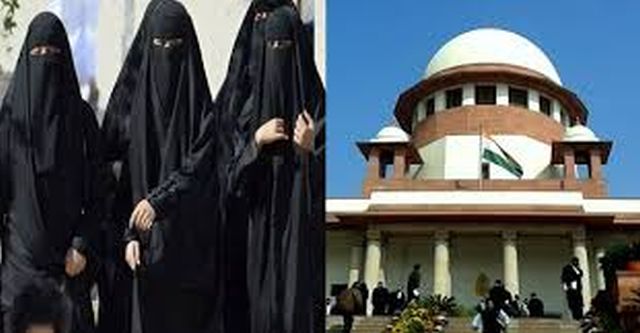
by Editor | May 25, 2021 | News, Politics
 New Delhi : The Supreme Court on Monday directed the Central government to file a comprehensive report detailing the facilities being provided to Rohingya refugees staying at two camps in Haryana, saying “let us try to solve human problems first”.
New Delhi : The Supreme Court on Monday directed the Central government to file a comprehensive report detailing the facilities being provided to Rohingya refugees staying at two camps in Haryana, saying “let us try to solve human problems first”.
A bench of Chief Justice Dipak Misra, Justice A.M. Khanwilkar and Justice D.Y. Chandrachud said the report should be based on data about basic facilities like water, hygiene, toilets and medical facilities being provided to the Rohingyas in the Mewat and Faridabad camps.
The court order came as the Central government said it could not offer Rohingya refugees more basic facilities than what it was providing its own people including those living in slums.
The next hearing will take place on May 9 when the report will be considered.
Facing a mounting attack by the refugees’s petitioner on the denial of basic facilities, Additional Solicitor General Tushar Mehta raised questions on the spate of petitions filed on behalf of Rohingyas — a point he had made during the last hearing.
The government on March 19 questioned the credentials of the petitioners seeking to block deportation of Rohingya refugees, saying the genesis of the PILs threaten to change the country’s demography and destabilise it.
The petitioners on Monday demanded a court commissioner be sent to inquire into the conditions of the camps while senior counsel Rajeev Dhavan urged the court to ask the National Human Rights Commission — which he described as the custodian of human rights, civil liberty and socio-economic charter — to submit a report on the condition of refugees in Rohingya camps.
Both the suggestions were resisted by the government with Mehta offering to file the report.
The petitioners said the basic facilities that a human being should get under the Constitution’s Article 21 were being denied to Rohingya refugees.
Telling the court that Rohingyas were living in pathetic conditions, Dhavan said Rohingya refugees were a “separate class of people who have nowhere to go. They have no means to support themselves. This is a peculiar situation which is not there in any slums…”.
As Justice Chandrachud said the fundamental right to life is not just confined to Rohingya refugees but to every slum dweller, Dhavan said an Indian slum dweller can approach the elected representatives for help but Rohingyas can’t.
“They are helpless. They can’t approach anybody. Can’t go to anyone,” Dhavan said pointing out that “they are the most powerless of the powerless. They too have rights under Article 21”.
Making common cause with the Central government, senior counsel Mahesh Jethmalani said he supported the position taken by it and there could be no “privilege enclave” for Rohingya refugees.
Jethmalani appeared for one of those supporting the government’s stand on Rohingya refugees.
Defending the “push back” policy to prevent the Rohingya refugees from crossing the border into India, he said accommodating Rohingyas who have already entered was itself a difficult task.
He said “we can’t throw open our border and allow Rohingyas to come” as he taunted the “public spirited” petitioners to also see what happening the next door.
—IANS

by Editor | May 25, 2021 | News, Politics
 New Delhi : The Supreme Court on Tuesday declined to stay its ruling which activists say has diluted a law aimed at preventing atrocities on Dalits and tribes.
New Delhi : The Supreme Court on Tuesday declined to stay its ruling which activists say has diluted a law aimed at preventing atrocities on Dalits and tribes.
A bench of Justice Adarsh Kumar Goel and Justice Uday Umesh Lalit, however, said compensation can be paid to victims under The Scheduled Castes and Scheduled Tribes (Prevention of Atrocities) Act, 1989, even without a FIR being registered.
The bench said this on a plea by the Centre seeking recall of its March 20 order where the apex court had said that no arrest would be affected on a complaint under the Act without an inquiry.
—IANS

by Editor | May 25, 2021 | News, Politics
 New Delhi : The Supreme Court on Monday sought the Central government’s response on a plea challenging the constitutional validity of the practice of polygamy, nikah halala (a requirement for a divorced couple to remarry), nikah mutah (temporary marriage in the Shias) and nikah misyar (short-term marriage among Sunnis) amongst the Muslim community.
New Delhi : The Supreme Court on Monday sought the Central government’s response on a plea challenging the constitutional validity of the practice of polygamy, nikah halala (a requirement for a divorced couple to remarry), nikah mutah (temporary marriage in the Shias) and nikah misyar (short-term marriage among Sunnis) amongst the Muslim community.
A bench of Chief Justice Dipak Misra, Justice A.M. Khanwilkar and Justice D.Y. Chandrachud said the matter would be heard by the constitution bench, and directed that the matter be placed before the Chief Justice for setting up of an appropriate bench.
In addition to the notice missed to the Central government and others, the court ordered that a copy of the petitions be served on a Central agency so that it can apprise the office of Attorney General.
The court also permitted advocate V.K.Biju appearing for Kolkata based Muslim Women Resistance Committee to move an impleadment application in the case. He was permitted to be associated with any of the four petitions before the court.
Seeking response from the Central government and other respondents, the court did not include Law Commission as one of the respondents which was made a party by petitioner Nafisa Khan.
Issuing notice, the court noted the grounds stating that though these practices, which come within the domain of Muslim personal law, were not immune from judicial review under the Constitution.
The court has been moved by Sameena Begum, Nafisa Khan, Moullium Mohsin and BJP leader and advocate Ashwini Kumar Upadhyay challenging the practice of polygamy, nikah halala, nikah mutah and nikah misyar on the grounds of these being violative of Article 14, Article 15 and Article 21 of the Constitution.
Article 14 guarantees equality before law, Article 15 prohibits discrimination on grounds of religion, race, caste, sex or place of birth and Article 21 guarantees protection of life and personal liberty.
Telling the court that different religious communities are governed by different personal laws, Upadhyay has contended that “there could be no dispute, that different religious communities can have different laws, but personal laws must meet the test of constitutional validity and constitutional morality, in as much as, they cannot be violative of Articles 14, 15,21 of the Constitution”.
Pointing to the “appalling” affect of polygamy and nikah halala and other practices on the Muslim women, senior counsel Mohan Parasaran told the court that the 2017 judgement which had held instant triple talaq as unconstitutional had left these two issues open and did not address them.
The five judge constitution bench headed by Chief Justice J.S.Khehar (since retired) by majority judgment in 2017 had said: “Keeping in view the factual aspect in the present case, as also, the complicated questions that arise for consideration in this case (and, in the other connected cases), at the very outset, it was decided to limit the instant consideration, to ‘talaq-e-biddat’ – triple talaq.”
“Other questions raised in the connected writ petitions, such as, polygamy and nikah halala (-and other allied matters), would be dealt with separately. The determination of the present controversy, may however, coincidentally render an answer even to the connected issues,” it has said.
A Muslim husband is allowed to have more than one wife.
Under nikah halala, if a Muslim woman after being divorced by her husband three times at different instances wants to go back to him, then she has to marry another person and then divorce the second husband to get re-married to her first husband.
—-IANS

by Editor | May 25, 2021 | News, Politics
 New Delhi : The Supreme Court on Monday sought Centre’s response on a plea challenging the constitutional validity of the practice of polygamy and nikah halala amongst the Muslim community.
New Delhi : The Supreme Court on Monday sought Centre’s response on a plea challenging the constitutional validity of the practice of polygamy and nikah halala amongst the Muslim community.
A bench of Chief Justice Dipak Misra, Justice A.M. Khanwilkar and Justice D.Y. Chandrachud said the matter would be heard by the constitution bench.
The court directed that the matter be placed before the Chief Justice for setting up of an appropriate bench.
Appearing for one of the petitioners, senior counsel Mohan Parasaran told the court that the 2017 judgement which had held instant triple talaq as unconstitutional had left these two issues open and did not address them.
A Muslim husband is allowed to have more than one wife.
Under nikah halala, if a Muslim woman after being divorced by her husband three times at different instances wants to go back to him, then she has to marry another person and then divorce the second husband to get re-married to her first husband.
—IANS

by Editor | May 25, 2021 | News, Politics
 New Delhi : The Supreme Court was on Friday told that a mosque will remain a place of worship even after it has been desecrated and destroyed through a “barbaric act.”
New Delhi : The Supreme Court was on Friday told that a mosque will remain a place of worship even after it has been desecrated and destroyed through a “barbaric act.”
“A mosque will remain a place of worship even after it has been destroyed,” senior counsel Rajeev Dhavan told the bench of Chief Justice Dipak Misra, Justice Ashok Bhushan and Justice S. Abdul Nazeer, hearing a batch of cross petitions challenging a 2010 Allahabad High Court verdict on the Ayodhya title suit.
“It is quite a different matter to say that an area has been acquired and quite another to say mosque is not a mosque forever,” Dhavan said.
Dhavan appeared for the main petitioner, Mohammad Siddiqui, now being represented by legal heirs.
The bench is hearing arguments on the plea to revisit 1994 top court judgment which had said that the mosque was not was not an essential part of Islamic religious practice and that namaz could be offered anywhere, even in open places.
Describing the December 6, 1992 demolition of the Babri Masjid as a “barbaric act”, Dhavan said: “What was desecrated was a mosque and what court is being asked to is to protect the idols (of Ram Lalla).”
Telling the court that the government can acquire the place of worship, Dhavan said: “It is abundantly clear that a mosque should be treated as equal any temple” and “Ramjanmabhoomiu is equal to mosque”.
Referring to “two powerful Rath Yatras” led by senior BJP leader L.K. Advani, Dhavan told the bench that “there was strident, calculated and deliberate attempt to destroy Babri Masjid”.
Senior counsel K. Parasaran, appearing on the other side, said that the 1994 top court observation that a mosque was not an essential part of Islamic religious practice and namaz could be offered anywhere was in the context of acquisition proceedings.
At this, the bench said that if it decides to revisit the 1994 judgment, then it would be on the principle whether mosque was an integral part of Islamic religious practice.
In the last hearing of the matter on March 14, Dhavan had told the court that if the positrion in the 1994 judgement was to accepted then except for Makkah, Madinah and Dome of the Rock in Jerusalem, rest of the mosques will be of no consequence to Muslims.
On the next hearing on April 5, Dhavan will address the court on what mosque means to Islam.
—IANS

 New Delhi : The Supreme Court on Monday directed the Central government to file a comprehensive report detailing the facilities being provided to Rohingya refugees staying at two camps in Haryana, saying “let us try to solve human problems first”.
New Delhi : The Supreme Court on Monday directed the Central government to file a comprehensive report detailing the facilities being provided to Rohingya refugees staying at two camps in Haryana, saying “let us try to solve human problems first”.




